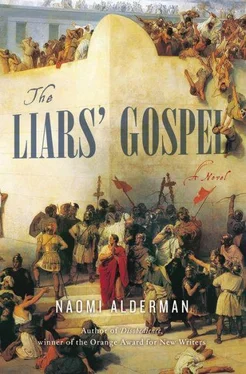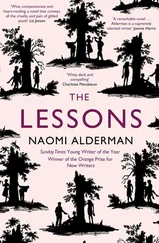He listened to their breathless words. One pleaded with him to leave the Temple. Another demanded that all the able-bodied young priests should take arms. A third suggested that they go out to meet the conqueror with a show of welcome. The conqueror was coming, he repeated, he was making for the Temple.
The High Priest said to them, “Two lambs, without blemish. One in the morning, one at dusk. Together with a grain offering of fine flour mixed with oil. This is the burnt offering instituted at Sinai. An offering to the Lord.”
They became quiet. But, protested one, the conqueror is coming, he approaches. The others silenced him, stiffening their spines and pulling their robes around them. They hurried to their duties, their hands and legs knowing the ritual even as their minds blew here and there. This one began to burn the incense, that one to clean the ashes, those began to lay fresh wood.
As the sun rose above the horizon, they slew the lamb. They scattered its blood. Some of the priests were silently weeping. They could all hear the shouting outside the gates of the Temple. They continued nonetheless to separate the organs, the sacred forbidden fat. They heard the foot beat of the army, that terrible consolidated crunch of one hundred right feet going down in unison. The lie of uniformity. As if they could become one creature. As if each of them, like this lamb, would not be utterly alone at the moment of death. No one else will save you from your own death, that is certain.
They burned the sacred portions of flesh. The High Priest felt his stomach growl as he inhaled the sweet scent of meat, because even now he was still just a man. The noise had ceased outside the Temple. The great gates were opening. Either there was no one left to defend them or they had surrendered in the face of insurmountable numbers. Well, they would find out for themselves soon enough. They began to prepare the wheat-meal offering, singing the psalm of the day. They brought the flour cake from its store. They anointed it with oil and frankincense.
And it was as they were preparing this offering that the conqueror, together with his troops, entered the Temple.
The matter was dealt with swiftly. The soldiers poured into the inner courtyard, shouting words in their own language, issuing and obeying commands at a run. They did not pause, even at the sight of the holy rituals. One or two of the priests attempted to run and were cut down. The High Priest was pleased to note that most of the younger men simply continued with their duties: burning the incense, fanning the flames, pouring the libations of wine. And if their arms trembled or their heads jerked or their mouths cried out when a sword ran them through, would not God in His infinite mercy forgive it?
The Romans swept through the sanctuary so quickly that they themselves seemed surprised, even alarmed, at how easily the thing had been done. They glanced at each other. The city had been a fortress, well defended. Was its heart to be taken without resistance? They looked around. The only man left alive was the High Priest; they had spared him to speak to their leader, the commander who was even now arriving.
The High Priest had expected a larger man, a brute with muscles of iron and a towering height. And a young man, why had he expected that? Perhaps because his way of making war had been so energetic. Pompey was forty-five, with a rather vague air, the lines on his forehead suggesting eyebrows constantly raised. He might have been powerfully muscular once, but he had run a little too fat now. He wore not the armor of battle but the toga of state, as if about to attend a meeting in the Senate.
His centurion addressed the High Priest.
“Pompey, commander of the Eastern legions and the Euxine fleet, triumphant conqueror of Hispania, consul of Rome, first man of the Roman Empire, primus inter pares, bids you…”
The centurion continued to speak. The High Priest looked at the meal cake in his hand. Flour, oil, water, baked to a fine flat bread. He crumbled the soft cake and placed it in the fire as was his duty. The flames flickered green and blue. He watched the cake burn.
The centurion, angry to receive no response, grabbed the High Priest’s arm roughly, seemed about to strike him, when a single word from Pompey stopped him.
Pompey motioned his men to lower their weapons. Together, they watched the meal cake burn, as flour cakes and lambs and oxen burned on the altars of Rome to their own many gods. The stone floor was thick with the blood of the slain, the bodies still warm. The sweet scent of the smoldering oil and flour traced a thread of delicious aroma through the iron stench of blood. The cake was entirely consumed. Pompey uttered a word. The centurion drew his sword, grabbed the priest’s chin, pulling it up and back, and slit the man’s throat.
This had been the last offering made by a free man in the Temple.
Pompey was not an ungenerous man. His Hebrew spies informed him that it was a grave offense among the Jews for an outsider to enter the holy inner sanctuary. This prohibition could not, of course, be adhered to, but nonetheless he made his survey of the Temple with courtesy, examining the objects and having his scribe record them.
How many talents of gold?
Two thousand.
What golden vessels?
The lampstand, the lamps, the table, the cups.
Spices?
Yes, great chests of them, a prince’s ransom.
Because he was impressed by the people whom he had conquered, because he had no wish to humiliate them further, he allowed them to keep these sacred treasures. And because he wished the people to feel the magnanimity of Rome as well as its power, he summoned the other priests, those who had not had the duty to attend the Temple that day, and bade them clean the inner courtyard of the blood and bodies of their friends and to begin the services once more. In this he was an astonishingly charitable conqueror.
The position of High Priest, of course, was a powerful one which could not simply be given to the next man in seniority. Pompey put his friend in that place, a Jewish prince who had been most cooperative during the siege and whose men had fought for Rome. It was a fitting gift for a loyal ally. This business concluded, Pompey left a garrison at Jerusalem and headed back to Rome in triumph.
This was how it happened. And everything that came afterwards followed from this.
THERE IS A dead boy on the hillside, they say. Or maybe just almost dead. The herder Ephrayim found him when he was seeking a lost lamb, and does not know how long he has lain in the shallow cave between the pathways. Where has he come from? They don’t know. The clothes look like those made in Shomron, but the shoes are Galilean. Sturdy shoes, said Ephrayim, laying thereby his claim should the boy be lost. Sturdy, but still he should not have tried to cross the hills alone. It has been six cold nights one after another. Snow has fallen although it is nearly spring.
Still, if he is dead he must be buried, and if he is not dead they must attempt, at least, to care for him. They bring him to Natzaret thrown over the back of a mule. This is where Miryam first sees him. He is breathing, just a little, very shallow breaths, and they have wrapped him in furs. As they bring him in, a crowd comes to see — is he someone’s cousin? Someone’s nephew? Why did he come to Natzaret at such a time of rough travel? No one recognizes him. They push Miryam to the front in any case, to take a good look. A mother would know her own son, however changed he might be. Though they know there is no hope and he is at least a decade too young. But just in case.
Her youngest son, Iov, tugs on her skirt and says, “Who is it, Ima? Who is it? Why does he look like that, Ima?”
Читать дальше












